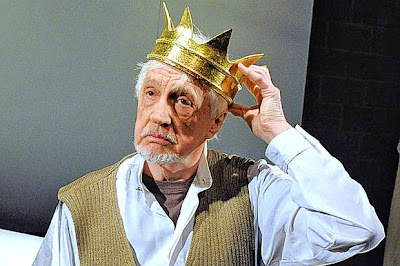A few years ago, that whimsical and touching actor Edward Petherbridge suffered a stroke while rehearsing the title role of King Lear in New Zealand. He was almost unable to move, but could remember every word of Lear’s lines. You might expect this theatrical re-enactment of the trauma to be a misery memoir or a tale of courage in adversity, but it is neither of those things.
Co-written by Petherbridge, his co-star Paul Hunter and the show’s director Kathryn Hunter (who once famously played King Lear herself), this is a show of constant invention and delight.
We get a lot of King Lear, with Petherbridge delivering the mad king’s lines with a rare, spellbinding gentleness, but as the actor himself has said, the show is like watching a masterclass on King Lear under the influence of LSD. Even the stage design is tilted at a crazy angle.
Petherbridge, now 76 and fully recovered, revisits his childhood in Bradford, and delivers entertaining theatrical anecdotes about his time at Olivier’s National Theatre. He even does on-stage paintings of Lear and his daughters that are part Jackson Pollock, part Rolf Harris.
This is also a show about putting on a show, and one that frequently strays into fantasy, with Paul Hunter playing, among many others, a lunatic brain doctor in a terrible wig convinced he is treating the real King Lear, as well as giving touching performances as both Cordelia and Petherbridge’s mother. He also offers some hilarious impersonations of Laurence Olivier.
My Perfect Mind is a show unlike any other and one that captures Petherbridge’s endearing personality, both as an actor – who can forget his extraordinarily moving Newman Noggs in the RSC’s Nicholas Nickleby? – and as a man.
Charles Spencer, TELEGRAPH, 8 April 2013
 |
| Photo by Alastair Muir |
In 2007, the veteran English actor Edward Petherbridge went to New Zealand, expecting to play King Lear. But within a couple of days of starting rehearsals, he had a stroke and his hopes of tackling this exacting Shakespearean role were dashed — though the lines were all intact in his memory.
My Perfect Mind explores this episode and its implications. It is the work of Told by an Idiot, a company with a gift for inventive physicality. Taking its name from one of Lear’s self-diagnoses, a fearful statement about his crumbling sanity, it mixes tomfoolery and pathos.
Petherbridge blends autobiographical recollections with snatches from his unseen Lear, shaking them around to create an unlikely but juicy cocktail. Paul Hunter plays several characters: among them are Petherbridge’s doctor and mother, as well as Laurence Olivier and a theatre director whose manner put me in mind of Rhys Darby’s hapless fixer Murray Hewitt in Flight of the Conchords. The results are charming, sometimes very funny and occasionally bizarre.
On a sloping set designed by Michael Vale, the two actors evoke a lopsided world. This is obviously an image of Petherbridge’s post-stroke existence but it’s also a vision of the peculiarities of theatre. My Perfect Mind sometimes feels like a critique of stage lore and actors’ arcane practices — from the conventions of the rehearsal room to the limitations of mime — and as such it will probably appeal most to theatre junkies.
Certainly there are moments where the show edges towards being a parody of a high-concept dramatic provocation. Yet it is much more than that, suggesting among other things the way performers are haunted — not just by the achievements of their predecessors but by ghostly intimations of where their own careers might have led.
It’s a celebration of theatre’s special capacity to “stab at the truth” in a way that often seems difficult in real life.
There is a carefully managed chaos in Kathryn Hunter’s production. Paul Hunter treads a fine line between zany charisma and clownish excess.
Meanwhile, Petherbridge gives a layered performance that combines candour, wit, quizzical vagueness and a dry dignity. His understated yet heartfelt work is essential to the success of this playful and highly unusual piece.
Henry Hitching, EVENING STANDARD, 8 April 2013